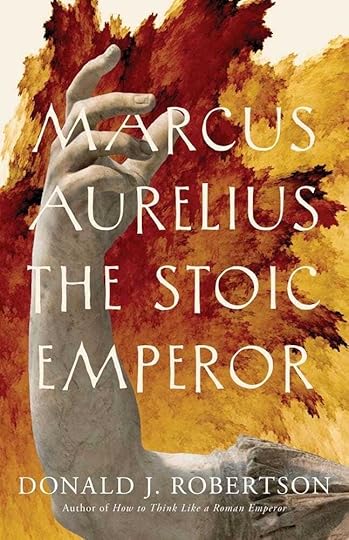Responding to Critical Reviews of "Marcus Aurelius: The Stoic Emperor"
Some people say you should never read negative reviews. I disagree. I love reading all reviews, good or bad. How can we grow as writers or creators if we ignore our audience? In this recent video, Jerry Seinfeld, likewise, talks about his love of Marcus Aurelius’ Meditations and how he learned to enjoy reading critical reviews of his work. We can benefit a lot from critical feedback, as long as we receive it wisely.
Stoicism: Philosophy as a Way of Life is a reader-supported publication. To receive new posts and support my work, consider becoming a free or paid subscriber.
I’ve been lucky that all of my books have been pretty well-received. My most recent is a biography called Marcus Aurelius: The Stoic Emperor, for Yale University Press’ Ancient Lives series. It currently has 4.27 stars from 139 reviewers on Goodreads, and 4.7 stars from 71 reviewers on Amazon, plus 4.7 from 21 reviews on Audible US — that’s quite good compared to my other books. I’ll respond to excerpts from reviews below but link to the original in case anyone thinks I’m taking them too much out of context. I assume that no book is perfect, and everything can be improved. And I also find that reflecting on criticisms can often help to bring to light some interesting observations about the writing process and the content of the texts themselves. So here are my thoughts about all of the criticisms of Marcus Aurelius: The Stoic Emperor that people have made so far…
 What reviewers didn’t like…
What reviewers didn’t like……those more interested in Stoicism rather than a prosaic biography of Marcus would be better served by reading Mediations itself, Discourses by Epictetus, a collection of Seneca’s letters, and How To Think Like a Roman Emperor (3/5 stars and also by author Donald Robertson*). In fairness to Mr. Robertson, a focus on Stoic philosophy in this book might have made it too similar to his other aforementioned work. — Goodreads
I can’t argue with the conclusion. I agree that you’d be better off reading the Meditations, or other primary sources, if your goal is to learn more about Stoic philosophy. I’m not sure about the premise, though: that this book should deliver more philosophy. This is very much a biography — and part of a series of ancient biographies. So don’t expect it to provide a comprehensive account of Stoic philosophy. Compared to other biographies of Marcus, this one was intended to link his life more to his philosophy, and I think it achieves that to some extent. But it’s definitely not intended as a substitute for reading the Meditations. Could we signal more clearly to readers that it’s a biography and not a textbook on philosophy? I don’t think so, to be honest — it seems pretty clear to me from the cover — but maybe I’m wrong.
Could it have been a biography of Marcus, though, that also includes a lot more philosophy? Well, that’s possible, although there’s a limit to how many words the books in this series could be (as with most books). The primary goal is for it to be a comprehensive biography so to also go into much more depth about the philosophy we’d need a bigger book, which wouldn’t have been possible within the parameters of this series, unfortunately. Of course, I think the solution, if you want both a biography and a book on Stoic philosophy, is simply to read two books: perhaps this one and How to Think Like a Roman Emperor, or another introductory text on Stoic philosophy.
Maybe I should read it and not listen. The narrator's voice was pleasant, but I think I might have focused better seeing the names.— Goodreads
Not everyone likes my voice, to be fair. So it’s good that this reviewer does. It doesn’t seem like a criticism of the book per se but perhaps underneath this comment there is one: that there are too many Latin (and Greek) names. That’s a tricky one. We did try to reduce those, believe it or not, but if we’re going to do a thorough biography, it’s hard to avoid mentioning names of places and people quite a lot. For a Roman emperor, those are going to be mostly Greek and Latin, unfortunately. We did put quite a bit of effort into simplifying many names by abbreviating them, choosing to use slightly Anglicized pronunciation where appropriate, or using other devices.
I liked Verissimus better. This was a bit dry and repetitive. Kudos on the scholarship. Would have liked more about the philosophy, along with the details about the successive campaigns. — Goodreads
I’m glad the reviewer liked Verissimus, my graphic novel about Marcus Aurelius. Different books appeal to different people. Verissimus and Marcus Aurelius: The Stoic Emperor are completely different styles of book. (There are probably other people who would prefer this book and dislike Verissimus.) I would describe my writing style as deliberately melodramatic, so I’m sure some people would find it dry — that’s always a risk with ancient history and philosophy — but I’d be more inclined to expect the opposite criticism. It’s a very conscious choice that I make to use language and certain literary devices to make my books about history more dramatic than normal. That style of writing isn’t everyone’s cup of tea, but I’ve been pleasantly surprised to find that most people seem okay with it.
I do think my nonfiction writing can be repetitive — there are usually technical reasons for that, e.g., when talking about how to apply Stoicism or CBT to different emotions there’s a lot of overlap so it can be a serious challenge to avoid repetition. I’m not sure how this biography repeats itself, though — in the editorial process we searched for any redundancy and tried to weed out anything that was said more than once. (Except for maybe two instances, where it was deemed necessary.) The question about including more philosophy was touched on above: I think if we want the biography to be as complete as possible, we’d need a longer book for that, which wasn’t possible within the constraints of this series. As for more details on the military campaigns, that’s more or less all the information we have. (Although it’s always possible to flesh them out more by drawing on general information about legionary equipment and tactics, and so on.) Also, I think that going into much more detail about military campaigns, may perhaps have turned off some other readers, who aren’t into that side of things.
A short biography of the philosopher/king of ancient Rome. Here the reader is given the facts as known (and much is unknown) about the life led by Marcus Aurelius. However, it is not a book for delving deep into his stoical philosophy. After putting down this book, I thought why did I take my time to try to understand some obscure and ancient conflicts (such as the one with Cassius the Usurper)? — Amazon
It’s 50k words, which is an average length book. That might be shorter than people expect for some biographies, though. It’s the same as the rest of the Ancient Lives series. Do we know much about Marcus? It’s relative to your expectations. We know little about most ancient figures, compared to modern ones, of course. Overall, I think most historians would say we are actually fortunate to know quite a lot about Marcus Aurelius — almost all of which is covered in this book. In fact, we probably know more about Marcus than we do about any other ancient philosopher, certainly more than we do about any other Stoic philosopher. That’s because he was also an emperor, so records exist of his rule, as well as inscriptions, statues, monuments, legal digests, and correspondence, etc.
Again, if you really want a deep dive into Stoic philosophy, yes, you’d be better to read a book dedicated to that subject, rather than a biography of Marcus Aurelius. I can see why someone might think “Do I care about the civil war with Avidius Cassius?” That’s a key part of Marcus’ biography, though, so it really just comes down to whether you’re interested in finding out about the events of Marcus’ life, and his relationships with other people, or you’re looking for something else from the book. I have found, from the courses I run on Marcus’ life and philosophy, that people who are really interested in the Meditations tend to say they get a lot more from the text once they’ve learned more about Marcus’ biography. Some reasons why that might be the case are obvious: Marcus mentions lots of other people in book one so knowing who they are and what his relationship with them was like makes it easier to understand what he is writing about. Avidius Cassius isn’t mentioned in the Meditations but I think knowing that, at that time, he was Marcus’ general, and probably a friend of sorts, who would later betray him and start a civil war, sheds a different light on many of the passages from the Meditations, such as 2.1, perhaps the most famous of them all, where Marcus tells himself to prepare each day to deal philosophically with people who may be deceitful or treasonous… such as Cassius.
Nothing to dislike, however the narrator was rather monotone and the book was heavy with names and places. Already aware of Marcus and his stoic ethos, I had hoped to put more detail and colour to his character, but I felt this was in relatively short supply. In some respects I felt that I got to know Hadrian and Lucius better than I did Marcus. Nevertheless, an informative listen overall. — Audible
A couple of people have said my delivery is monotone but actually I more often get the contrary criticism that my accent makes my delivery slightly sing-song, and some people don’t like that. I’m lucky that despite having an accent, the majority of listeners seem to quite like my delivery. It’s not to everyone’s taste, though. We do make a conscious effort when in the studio to vary the tone of certain passages, and the producer may ask me to do several takes of them specifically for that reason.
Again, we tried to simplify and reduce the foreign names but that’s bound to happen with an ancient biography, to some extent. I do concur somewhat that we learn more about Hadrian and Lucius in some ways. That’s because the ancient histories tend to contrast characters. Marcus is portrayed as calm and reasonable, and they highlight that by contrasting him with more erratic and unreasonable men, such as his adoptive brother Lucius Verus. Stories about calm and reasonable men can often seem, well, boring. It’s the crazy ones, usually, who make stories more colourful. So we learn about Marcus by setting his behaviour in a social context, in relation to more dramatic characters.
I made a decision to say more than normal about Hadrian because I thought the contrast highlighted important aspects of Marcus’ life and character, which have been somewhat overlooked in previous biographies. To be quite blunt, I believe that Marcus’ character was profoundly affected by the loss of his father, when he was a small boy, and being taken under the wing of Hadrian was probably quite traumatic for Marcus, as a teenager. I think his horror at Hadrian’s purges, and other excesses, was one of the things that drove Marcus into the arms of Stoic philosophy, and explains his psychological development.

Thank you for reading Stoicism: Philosophy as a Way of Life. This post is public so feel free to share it.



